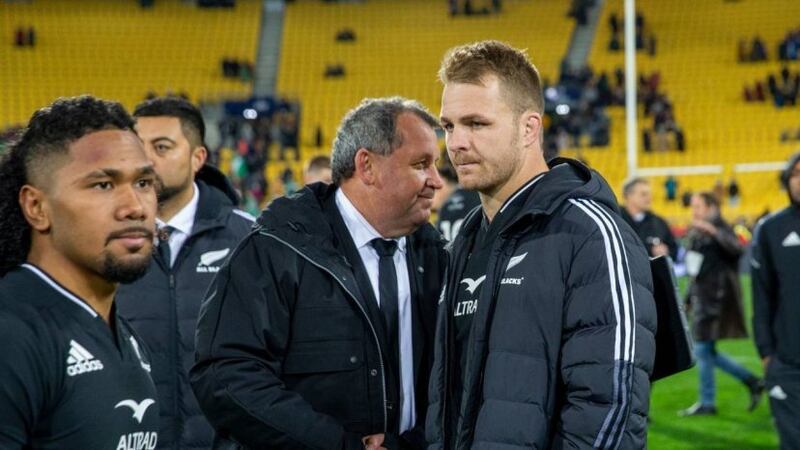All Blacks head coach Ian Foster and captain Sam Cane after the series loss to Ireland. Photo / NZME
A leading sports psychologist has sounded the alarm over criticisms being levelled at the All Blacks on social media and by commentators, following the team’s biggest loss to the Springboks in 94 years.
Sara Chatwin cautions the public skewering of the All Blacks, some of which have amounted to death threats, have the potential to damage players' mental health, and in all likelihood might serve to make the team’s performance even worse.
"If people in the New Zealand sporting public really wanted to get behind their team, they would just leave it alone," Chatwin tells TeAoMāori.news
Social media adds layers of "scrutiny and stress"’ to players and management as they try to turn around a team's poor fortunes, Chatwin says, and it’s something that can be hard to prepare for.
"It's [social media] very harmful and relentless and enables everybody to become a pseudo expert, when they are not an expert,” Chatwin says.
“We have to be aware on a human level that these players are human. A lot of players are young, young men in the case of the All Blacks, but also there are young women [in other fields] and I just think we have to be mindful of that.”
Most cope
Chatwin’s warning comes a day after Michael Hooper, the second youngest Wallabies captain of all time withdrew from the team’s lineup against Argentina in the weekend; Chatwin wasn’t asked about Hooper’s case but says at the pro level all players' coping mechanisms differ.
“Because of our different back stories, different experiential input, different genetics, some people won't be so influenced or impacted. But there will be people who are … people from whom, you know, wellbeing is eroded.” Chatwin says.
“Most of them cope, they'll put on a brave face and do the best that they can, with all the insult and injury, they'll probably get from a sporting public, which really wants winners, not losers. But I do think that there's going to be some damage done to people who just find all of it too much and too stressful.”
Chatwin says in the case of Aotearoa, one of the biggest issues is how heavily as a nation New Zealand looks to professional sporting success, to define it.
Getting used to failure
“We have been very fortunate as New Zealanders to have such a long history of success. If you look at us, I mean, we define ourselves quite strongly on our sports teams.”
“Look at the one upside of this, look at the Commonwealth Games, we have experienced so much success.”
“It’s lovely to see some of the other sports giving us a little bit of the comfort that the All Blacks used to give us… and yeah the public probably has to get used to the fact that, you know?”
“We’ve had other [All Blacks] cycles that haven't been that great. We have lost the World Cup.”
“We've seen it in every other rugby-playing nation.”
“We're experiencing a little bit of a reformulation of players. And we've had coaches leave, and other coaches come on our board at different positions. So we're going through that kind of rebuild phase,” Chatwin says.
Low confidence
Chatwin says what strikes her most about the current ABs team, is a lack of confidence and communication.
“Confidence is at a low. You cannot experience this amount of defeat, without having your confidence knocked.”
“Strategies need to be put in place so that these things are built up. Not just at a team level. You start at an individual level, you look at each and every player and what's going on, which enhances the team's self-esteem and confidence.”
Communication within the entire organisation might need a rethink too, Chatwin says.
“You look at communication pathways between players, the coaching staff, the administrators, and all the people that work with them. You have to have a look at that whole machine.”
“You can't just be addressing one wheel that is falling off when all of them are,” she says.
Back to square one
Chatwin says fans would be naive to think NZRU bosses aren’t already considering rejigs to the national team’s coaching line-up, acknowledging they might "need advice from other people with additional perspectives" but the team's issues are endemic.
“You've almost got to go back to square one and look at the whole picture. So it's fitness, what the psyche of the individual is and what the mindset of the team is, are they communicating? What's the goal?”
“All of these are key attributes that you need to have functioning well to make you hungry for that victory, and not defensive and just focused on avoidance of failure.”
Chatwin’s advice for players in the public and commentariat’s firing line after the weekend’s loss is simple, but a game changer, she says.
“You don't want the criticism, particularly social media, because that’s a very accessible and easy way that people can get at athletes.”
“Don't be part of it, turn your accounts off. Just let your union and the powers that be deal with that.”
Chatwin concedes times are tough for the fans too, but says it’s not as though New Zealand hasn’t seen similar circumstances play out at other clubs around the world, including the ones who are beating the All Blacks right now.
“Of course when we experience defeat, it stings. But there are a lot of amazing rugby-playing nations, Ireland, South Africa, Australia.”
“We’ve seen this kind of drop-off in every context.”


